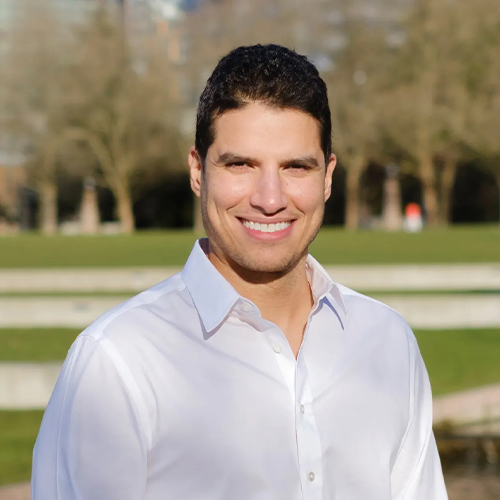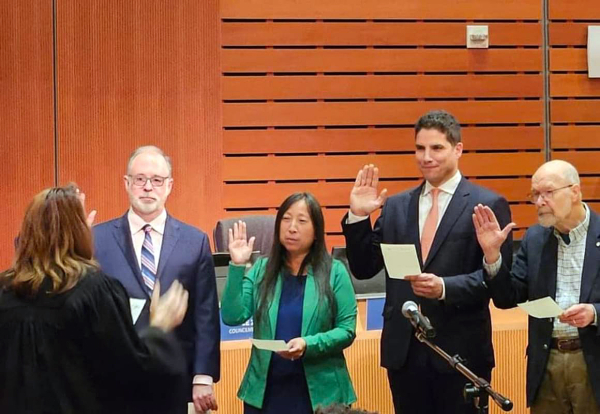Julia Davis
Mo Malakoutian brings his unique perspective from the realms of engineering and education to public service and local government.

Mo Malakoutian, CEE affiliate assistant professor
In the world of civil and environmental engineering, the leap to politics isn't a common one. But for Mo Malakoutian, CEE affiliate assistant professor and newly elected Bellevue, WA city council member, this unconventional path demonstrates how engineering principles can shape a successful political career. Elected this past November, Malakoutian brings his unique perspective from engineering and education to the forefront of local government. In addition to serving on the city council, Malakoutian’s new fellow council members elected him to the Deputy Mayor position during their inaugural meeting on January 2.
After obtaining his Ph.D. from CEE in 2012, Malakoutian has continued teaching in the department for over a decade. He covers a broad range of courses, including structural dynamics, steel-structure design, mechanics of materials, statics, temporary structures, and accounting and finance for construction. This extensive academic background provides a solid foundation for his role in civic leadership.
Tell us about your background before coming to the UW.
I'm from Iran, and when I was 17 years old, I needed to decide what to do. In Iran at the time, there were two high-end jobs you could do: medical doctor or engineer. So I got my undergraduate and master’s degrees in engineering and was very focused on the structural side of things. Then I worked as a structural engineer and project manager in heavy infrastructure projects in Iran and Qatar. After seven years, I found myself completely burnt out and decided to pursue my Ph.D. and see where that took me.
How did your career goals shift during your Ph.D. work?
Two years in, I realized I was not interested in being a full-time faculty member at a research institute. So I decided to finish my Ph.D. and then figure something out. I’m glad I did that because I started teaching and have a huge love for it. I still go into my teaching with excitement, even after 12 years.
What motivated you to transition from engineering and academia into public service and politics?
I always wanted to give back—to increase the circle of my impact in my community. When it comes to making the world a better place, I feel like it starts with making a difference in your own life, then moves on to helping out family and friends, and eventually leads to having an impact on the community around you.
How did you begin to become involved in local politics?

Malakoutian (second from right) at his Bellevue City Council Inauguration on Dec. 11, 2023.
My entry into civic engagement was quite organic. Initially, it started with my involvement in various nonprofits. For the past eight years, I have worked with a local nonprofit, Wellspring Family Services, which focuses on preventing family homelessness. Nonprofit work was my way of giving back and expanding my impact in the community. But my direct involvement in local government began unexpectedly. I received a letter about a significant remodeling project in my condo association, and given my background in construction, I realized I had to get involved. The HOA board members were great people, but they lacked construction expertise, so I decided to join and see where I could contribute. That experience on the HOA board showed me the impact of having technical knowledge in community decision-making. The experience motivated me to participate in the Bellevue Essentials program, an 11-week introduction to civic leadership. Subsequently, I served on the Bellevue Planning Commission, where I furthered my involvement in local government for six years.
After being on the planning commission for a few years, I was encouraged by others in local government to run for city council, but I never wanted to run against any incumbents, so I held off. And then in 2023, an empty seat became available, and the person who was in that seat reached out to me and said, “Mo, I'm not running for re-election. If you are interested, I think you would be a great person, and I would endorse you for my seat.”
It was a tough decision, but eventually, I pulled the plug and made it official that I was running.
Why do you think politics would benefit from more engineers?
I remember asking CEE Professor Emeritus Joe Mahoney as far back as 2009 why there weren’t more engineers in politics. Because I knew engineers would make good politicians: we want to solve problems and are pragmatic.
We also have a code of conduct as engineers, so we know about integrity and ethics, and I think everyone [in politics] should have that. As engineers, we have the skills to solve problems systematically and methodically. We know data. We know mathematics as a foundation of decision-making; we are project managers. We know how budgets work and how to manage stakeholders—everything we do as engineers is related to politics or regulation.
In what ways does your engineering background influence your decision making in politics?
I try to find a solution that will work and improve something, and that's what engineers do. That's how engineers’ brains are wired: to improve processes and make things better with pragmatic solutions. The whole foundation of engineering gave me the skill set to think about systems and rely on data as the foundation of my decision making.
What do you see as the rewards of being involved in politics?
Politics is not for everyone. I think we need more engineers and good people in politics. But it’s a significant commitment, demanding extensive effort and the ability to navigate political complexities. The good side is all of the positive impact you can have--how your vote matters. I have many examples of how I influenced the planning commission to achieve a better outcome. It’s nice to feel like you changed something for the better.
How do you think an engineering education benefits those who pursue careers outside of traditional engineering fields?
Having a solid foundation in engineering really does allow you to do whatever you want. If you get your bachelor's in civil engineering first, the doors to you are open. You can do whatever you want after—you can work for the government, work in corporate America, go into politics, go into academics, and I am an example of that. I did all of those. But the engineering education is the foundation that shapes you and makes you a critical thinker, collaborator, and problem solver. That is something that you can take anywhere you want.
What brings you the most satisfaction in your roles as an educator and public servant?
I just get this satisfaction that I’ve never experienced in my life by teaching, and I don't know where it comes from. I love shaping future engineers and teaching them about stresses and strains (in an engineering context) while also teaching them about seeing the world through an engineering lens and helping them figure out what they want to do with that. I may not be the best teacher, but my students know I care about them, not just in my class but in whatever they choose to pursue in the future. And when I get an email from a former student that says, “Hey, you impacted my life, and I’m doing this right now, just wanted to let you know!” That just makes my day.
Originally published January 22, 2024